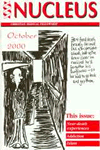Intermenstrual bleeding can occur physiologically due to a mid-cycle fall in oestrogen production. However, if a woman presents with a history of bleeding outside her own normal cycle then the cause should be elicited. Bleeding can occur during early pregnancy and can herald the onset of a miscarriage. If abdominal pain precedes the discharge then the life-threatening condition of ectopic pregnancy must be excluded. The blood loss is often dark and is due to the uterus shedding the decidua giving the classical ‘prune juice’ description.
Age is an important factor in considering the likely cause of intermenstrual bleeding. In the younger woman pregnancy and dysfunctional uterine bleeding are the most common causes. As age increases then fibroids, pelvic infection and cervical polyps become more common. In the perimenopausal woman endometrial and cervical carcinoma must be excluded. Sexually transmitted infections such as Trichomonas vaginalis or Gardnerella vaginalis would rarely cause vaginal bleeding. But salpingitis, which is commonly due to Chlamydia or Gonococcus, can present with a bloody discharge. Isolation in this case could reduce secondary infection if the bleeding was post-coital and may prevent male venereal infection, though this is a less common cause for intermenstrual bleeding.
The legislation in Leviticus 15:25-27 concerning this issue was unlikely to affect the hygiene or general health of the nation of Israel as most cases of discharge would be physiological or non-infective. The primary purpose of the Mosaic Code was to help Israel understand holiness. As a nation they were called to be separate from the world around them. Holiness was not an option for the Jew but a way of life. This is reflected by Paul in 2 Corinthians 6:14-7:1 and is a challenge to us all.
Differential Diagnosis 34
Mark 5:25-29: Here Jesus healed a woman who had been subject to bleeding for twelve years. What might have caused this?
Luke's opinion in the next issue.































